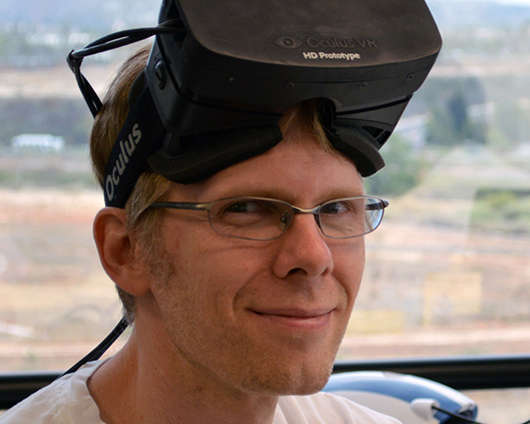Following Oculus's Lawsuit Loss, John Carmack Expresses Frustration [UPDATE]
"[I]n several cases, I just wanted to shout, 'You lie!'"
Update: ZeniMax has now responded to Carmack's post, reiterating certain findings from the case. The statement shared with GameSpot follows below.
"In addition to expert testimony finding both literal and non-literal copying, Oculus programmers themselves admitted using ZeniMax's copyrighted code (one saying he cut and pasted it into the Oculus SDK), and Brendan Iribe, in writing, requested a license for the 'source code shared by Carmack' they needed for the Oculus Rift. Not surprisingly, the jury found ZeniMax code copyrights were infringed. The Oculus Rift was built on a foundation of ZeniMax technology.
As for the denial of wiping, the Court's independent expert found 92% of Carmack's hard drive was wiped--all data was permanently destroyed, right after Carmack got notice of the lawsuit, and that his affidavit denying the wiping was false. Those are the hard facts."
The original story follows.
With the jury in the Oculus-ZeniMax lawsuit having rendered its verdict, Oculus and some of its executives have been ordered to pay $500 million to ZeniMax Media. John Carmack, one of the defendants and a former employee of the ZeniMax-owned id Software, has now spoken out about the case and a particular expert whom he suggests was "imprudent" during the trial.
"The Zenimax vs Oculus trial is over," he wrote on Facebook today. "I disagreed with their characterization, misdirection, and selective omissions. I never tried to hide or wipe any evidence, and all of my data is accounted for, contrary to some stories being spread. [A ZeniMax statement suggested he destroyed data after learning of the lawsuit.] Being sued sucks. For the most part, the process went as I expected."
However, Carmack took issue with one particular element, which was the testimony of an expert that ZeniMax brought to the trial. Specifically, Carmack objected to the "expert that said Oculus's implementations of the techniques at issue were 'non-literally copied' from the source code I wrote while at id Software."
Carmack claims, "This is just not true," adding that, "[T]he authors at Oculus never had access to the id C++ VR code, only a tiny bit of plaintext shader code from the demo."
"Early on in his testimony, I wanted to stand up say, 'Sir! As a man of (computer) science, I challenge you to defend the efficacy of your methodology with data, including false positive and negative rates.' After he had said he was 'absolutely certain there was non-literal copying' in several cases, I just wanted to shout, 'You lie!' By the end, after seven cases of 'absolutely certain,' I was wondering if gangsters had kidnapped his grandchildren and were holding them for ransom."

He goes on to suggest the testimony would not have stood out if the expert's phrasing had been different. As it stands, he said, " I am offended that a distinguished academic would say that his ad-hoc textual analysis makes him 'absolutely certain' of anything. That isn't the language of scientific inquiry."
Carmack also describes the expert presenting slides that couldn't be properly read. When the defense later enlarged them for the jury to better see them, it didn't "demolish the credibility of the testimony," as Carmack had hoped.
"Notably, I wasn't allowed to read the full expert report, only listen to him in trial, and even his expert testimony in trial is under seal, rather than in the public record," he continued. "This is surely intentional--if the code examples were released publicly, the internet would have viciously mocked the analysis. I still have a level of morbid curiosity about the several hundred-page report.
"The expert witness circuit is surely tempting for many academics, since a distinguished expert can get paid $600+ an hour to prepare a weighty report that supports a lawyer's case. I don't have any issue with that, but testifying in court as an expert should be as much a part of your permanent public record as the journal papers you publish. In many cases, the consequences are significant. There should be a danger to your reputation if you are imprudent."
ZeniMax has suggested it could seek an injunction "to restrain Oculus and Facebook from their ongoing use of computer code that the jury found infringed ZeniMax's copyrights." That's potentially a move that could present issues with the continued sales of the Oculus Rift, though it remains to be seen what will come of that, if anything. Oculus and the other defendants will presumably appeal the outcome.
For its part, an Oculus spokesperson told GameSpot, "The heart of this case was about whether Oculus stole ZeniMax's trade secrets, and the jury found decisively in our favor." ZeniMax had been seeking $4 billion in punitive damages, in addition to $2 billion in actual damages.
Got a news tip or want to contact us directly? Email news@gamespot.com